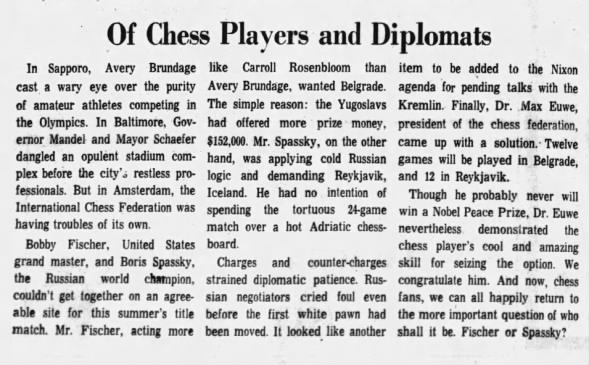The Baltimore Sun Baltimore, Maryland Wednesday, February 16, 1972 - Page 10
Of Chess Players and Diplomats
In Sapporo, Avery Brundage cast a wary eye over the purity of amateur athletes competing in the Olympics. In Baltimore, Governor Mandel and Mayor Schaefer dangled an opulent stadium complex before the city's restless professionals. But in Amsterdam, the International Chess Federation was having troubles of its own.
Bobby Fischer, United States grand master, and Boris Spassky, the Russian world champion, couldn't get together on an agreeable site for this summer's title match. Mr. Fischer, acting more like Carroll Rosenbloom than Avery Brundage, wanted Belgrade. The simple reason: The Yugoslavs had offered more prize money, $152,000. Mr. Spassky, on the other hand, was applying cold Russian logic and demanding Reykjavik, Iceland. He had no intention of spending the tortuous 24-game match over a hot Adriatic chessboard.
Charges and counter-charges strained diplomatic patience. Russian negotiators cried foul even before the first white pawn had been moved. It looked like another item to be added to the Nixon agenda for pending talks with the Kremlin. Finally, Dr. Max Euwe, president of the chess federation, came up with a solution. Twelve games will be played in Belgrade, and 12 in Reykjavik.
Though he probably never will win a Nobel Peace Prize, Dr. Euwe nevertheless demonstrated the chess player's cool and amazing skill for seizing the option. We congratulate him. And now, chess fans, we can all happily return to the more important question of who shall it be. Fischer or Spassky?
 Of Chess Players and Diplomats Wed, Feb 16, 1972 – 10 · The Baltimore Sun (Baltimore, Maryland) · Newspapers.com
Of Chess Players and Diplomats Wed, Feb 16, 1972 – 10 · The Baltimore Sun (Baltimore, Maryland) · Newspapers.com























